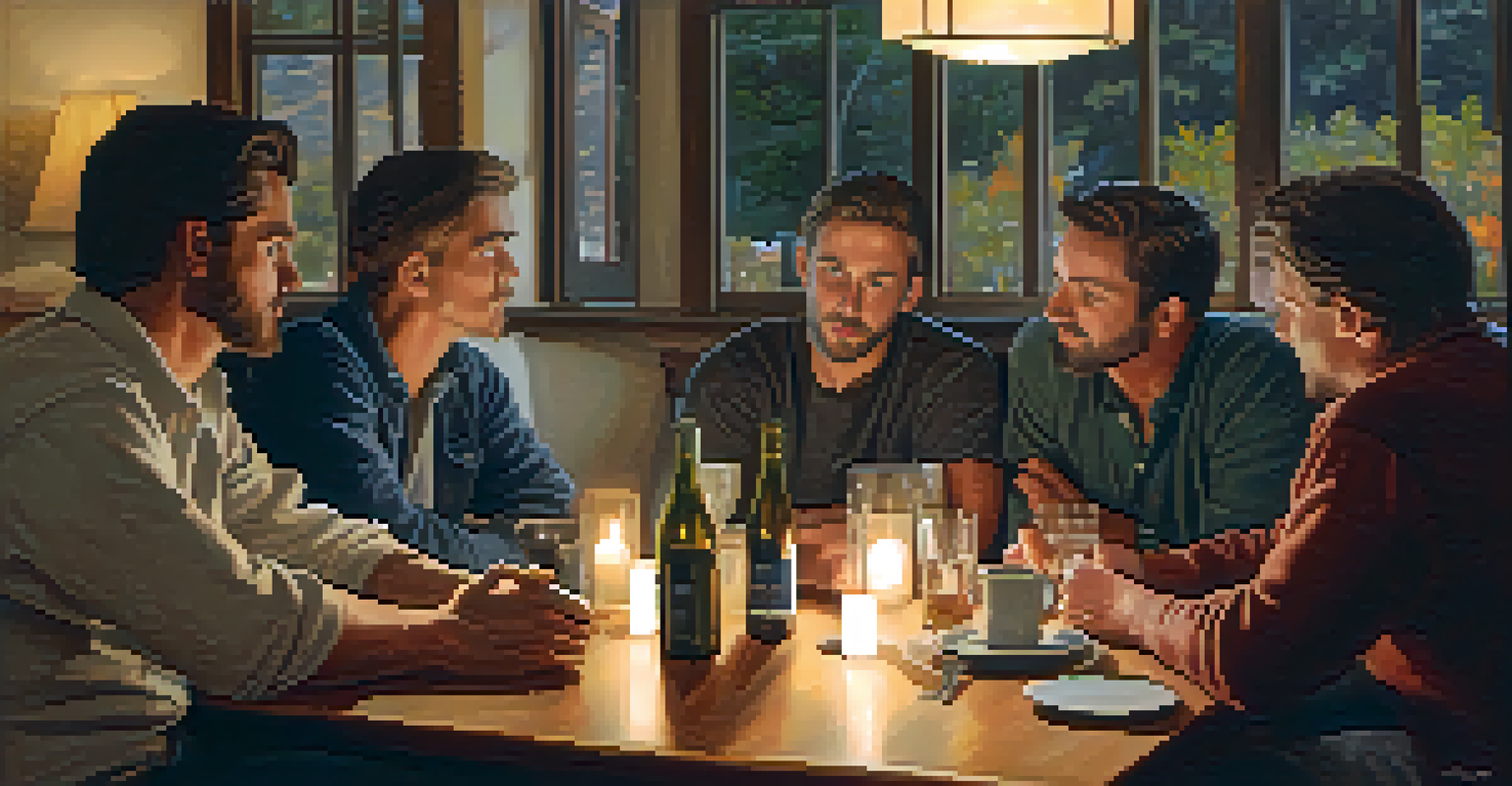Dealing with Grief: Mental Health Support for Men

Understanding Grief: The Unique Journey for Men
Grief is a deeply personal experience, and for many men, the journey can be particularly challenging. Societal expectations often pressure men to appear strong and stoic, which can make it difficult to express emotions openly. This reluctance to show vulnerability can lead to unresolved grief and increased mental health issues.
The greatest tragedy in life is not death, but a life without purpose.
It's important to recognize that grieving is not a linear process; it can involve a mix of emotions, including sadness, anger, and confusion. Men may feel isolated in their grief, especially if they believe they have to tackle it alone. Understanding that these feelings are normal can help men navigate their unique grieving paths.
By acknowledging that grief is a universal experience, men can begin to open up and share their feelings. This can lead to healthier coping mechanisms and allow for deeper connections with friends and family who may also be grieving.
Common Myths About Grief and Men
There are several myths surrounding grief, particularly when it comes to men. One common misconception is that men don't feel grief as deeply as women, which is simply untrue. Men can experience profound sadness and loss; however, they may express it differently, often through action rather than emotion.

Another myth is that men should 'tough it out' rather than seek help. This belief can prevent men from engaging in conversations about their feelings or reaching out for professional support. Challenging this notion is vital, as seeking help can be a sign of strength rather than weakness.
Grief is a personal journey for men
Men often face societal pressures that make it challenging to express their grief openly, leading to feelings of isolation.
It's essential to debunk these myths and create a more supportive environment for men to grieve. Encouraging open discussions about grief can help dispel stereotypes and promote healthier emotional expressions.
The Importance of Support Networks
Having a robust support network is crucial for men dealing with grief. Friends and family can provide a listening ear, helping men feel less isolated during this challenging time. These connections can serve as a lifeline, reminding them that they are not alone in their grief.
Grief can be a burden, but it can also be a gift. It shows us how much we have loved.
Support groups specifically for men can also be beneficial. They offer a safe space for men to share their experiences and emotions without fear of judgment. Sharing stories with others who understand can provide validation and promote healing.
Additionally, professional support from therapists or counselors can provide tailored guidance. These professionals can equip men with coping strategies and tools to navigate their grief in a healthy manner.
Healthy Coping Mechanisms for Grieving Men
Finding healthy ways to cope with grief is vital for emotional well-being. Physical activities, such as exercise or outdoor adventures, can help release built-up tension and improve mood. Engaging in hobbies can also provide a much-needed distraction while fostering a sense of accomplishment.
Creative outlets, such as writing or art, can be powerful ways for men to process their feelings. Journaling about their experiences can provide clarity and insight, while creative projects can serve as a tribute to lost loved ones. These activities can help transform grief into something tangible and meaningful.
Support networks are vital
Having friends, family, or support groups can help men navigate their grief and feel less alone in their experiences.
It's also essential to practice self-care during this time. Simple acts, like ensuring adequate rest, eating well, and spending time in nature, can have a significant impact on mental health.
The Role of Therapy in Grieving
Therapy can be an invaluable resource for men navigating the complexities of grief. A trained professional can provide a safe space to explore emotions without fear of judgment. This environment can encourage men to delve into their feelings more deeply and develop healthier coping strategies.
Different therapeutic approaches, such as cognitive-behavioral therapy (CBT), can help men identify negative thought patterns that may arise during grief. By challenging these thoughts, men can create a more positive outlook and find ways to cope with their loss.
Moreover, therapy can help men understand the grieving process better and accept that it's okay to feel a multitude of emotions. This understanding can foster resilience and encourage men to reach out for support when needed.
Finding Meaning After Loss
Finding meaning in the wake of loss can be a powerful part of the healing process. Many men find solace in honoring their loved ones through acts of remembrance, such as creating a memorial or participating in charitable activities in their name. These actions can transform grief into a source of purpose.
Establishing new routines and traditions can also help men create a sense of normalcy while remembering their loved ones. Whether it’s cooking a favorite meal or celebrating special dates, these rituals can provide comfort and connection.
Therapy aids in emotional healing
Professional therapy provides a safe space for men to explore their emotions and develop healthier coping strategies.
Ultimately, the journey to finding meaning is unique to each individual. Encouraging men to reflect on their experiences and explore what brings them joy can be a critical step in the healing process.
Encouraging Conversations About Grief
Creating an open dialogue about grief is essential for promoting mental health among men. Encouraging conversations can help normalize the experience and reduce the stigma surrounding emotional vulnerability. When men feel comfortable discussing their grief, they are more likely to seek support and share their feelings.
Community initiatives, such as workshops or seminars, can be effective in raising awareness about men's mental health and grief. These programs can provide valuable resources and foster a sense of connection among participants.

By encouraging conversations about grief, we can create a supportive environment where men feel empowered to express their emotions and seek the help they need.